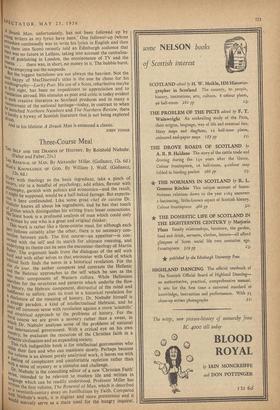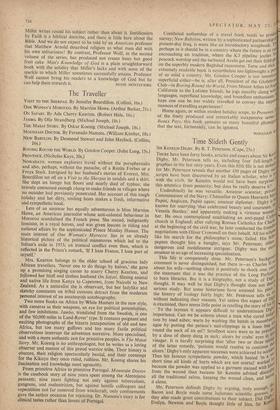Three-Course Meal
III
SELF AND THE DRAMAS OF HISTORY. By Reinhold Niebuhr. I (Faber and Faber, 21s.) s 12s. 6d.) hrisk,aT with theology as the basic ingredient, take a pinch of icq, stir in a handful of psychology, add ethics, flavour with Philos
°Ay, garnish with politics and economics—and the result,
be supposed, would be a half-baked farrago. But expecta- N.11, is here confounded. Like some great chef de cuisine Dr. oetouhr knows all about his ingredients, and he has that touch /1.geniu5 which distinguishes his writing from lesser concoctions. '13'281atest book is a profound analysis of man which could only ',written by one who is a great and original thinker. pa''his work is rather like a three-course meal, for although each lert follows suitably after the other, there is no necessary con- .ectinn between each. The first course—an appetiser—is con- 'enrdned with the self and its search for ultimate meaning, and qu'kerlYing its theme can be seen the encounter-theology of Martin The argument leads from the dialogues of the self with bibe':f and with other selves to that encounter with God of which lea' faith finds the norm in a historical revelation. For the Anarit du four, the author compares and contrasts the Hellenic the Hebraic approaches to the self which he sees as the sear main components of Western culture. While Hellenism hes for the structures and patterns which underlie the flow lefirtnrY, the Hebraic component, distrustful of the mind and a -.1..terent to nature, puts its trust in a historical revelation for a usisolosure of the meaning of history. Dr. Niebuhr himself is Pair trange paradox, a kind of intellectualised Hebraist, and he „8 off common sense with revelation against a more `scientific' .approach to the problems of history. For the '," course we are given a savoury rather than a sweet, in avich Dr. Niebuhr analyses some of the problems of national eou international government. With a critical eye on his own rh,t1„1711ry, he evaluates the resources of the Christian faith in a '.127lic civilisation and an expanding society. rel!`nis rich indigestible book is for intellectual gastronomes who thilsh their fare and who can masticate slowly. Perhaps because a fs volume is an almost purely analytical work, it leaves me with witheeling of complacent and comfortable repletion rather than a sense of mystery or a stimulus and challenge. I'. Niebuhr is the consulting editor of a new 'Christian Faith' lans: intended to be relevant to modern life and written in ‘vrrage which can be readily understood. Professor Miller has n the first volume, The Renewal of Man, which is described sjtWentieth-century essay on Justification by Faith. Compared Niebuhr's work, it is slighter and more pretentious and it aid scarcely serve as a main meal for the hungry inquirer. Miller writes round his subject rather than about it. Justification by Faith is a biblical doctrine, and there, is little here about the Bible. And we do not expect to be told by an American professor that Matthew Arnold described religion as what man, did with his own sblitariness! By contrast, Professor Wolf, in the second volume of the series, has produced not cream buns but good fruit cake. Man's Knowledge of God is a plain straightforward book with the solidity that Miller's lacks and with none of the sparkle to which Miller sometimes successfully attains. Professor Wolf cannot bring his readers to a knowledge oP God but he











































 Previous page
Previous page